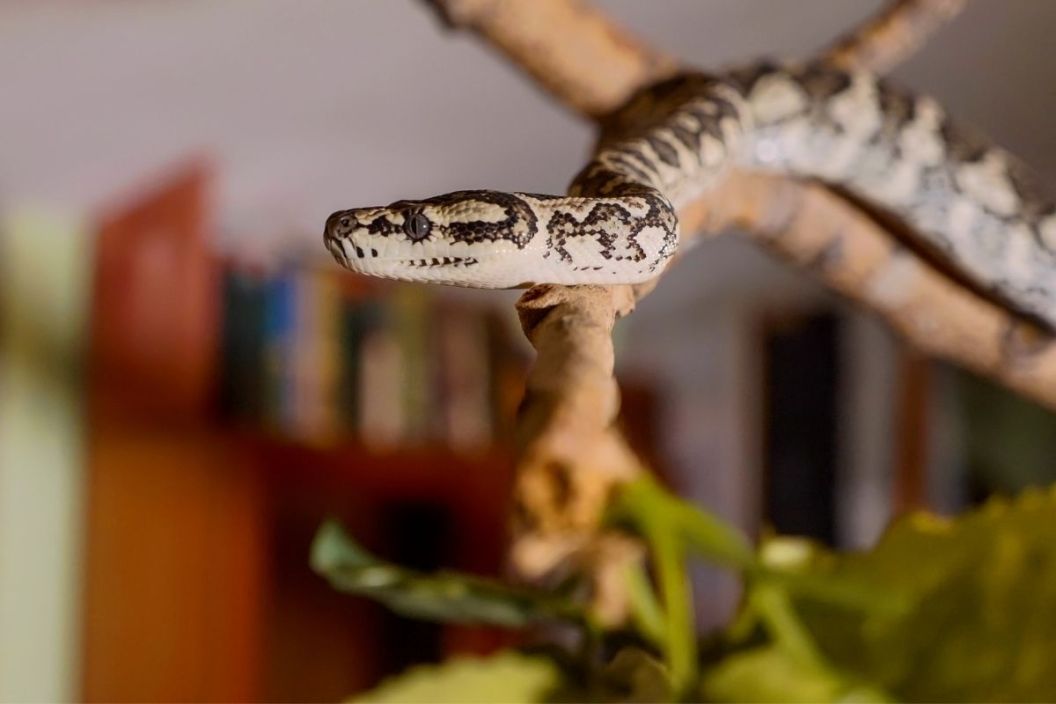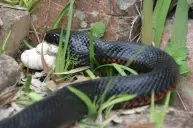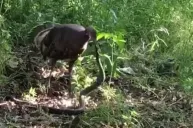Here's how to snake-proof your coop and use snakes to your benefit.
Have you ever found a snake in the chicken coop? Is it your first instinct to shriek when you see a snake? That's most people's reaction, and with good reason!
Snakes are usually an unexpected, slithery surprise. And some poisonous snakes are deadly. Whether or not you are dealing with venomous snakes or "harmless" snakes, it's important to keep snakes out of your chicken coop to keep the eggs, chicks, and even your chickens safe from snake attacks.
Read on to learn how to keep snakes out of the coop, how to trap snakes, why golf balls aren't the best trap for snakes, and how to work with nature to reap the potential benefits of snakes.
How Snakes Can Help You and Your Chickens
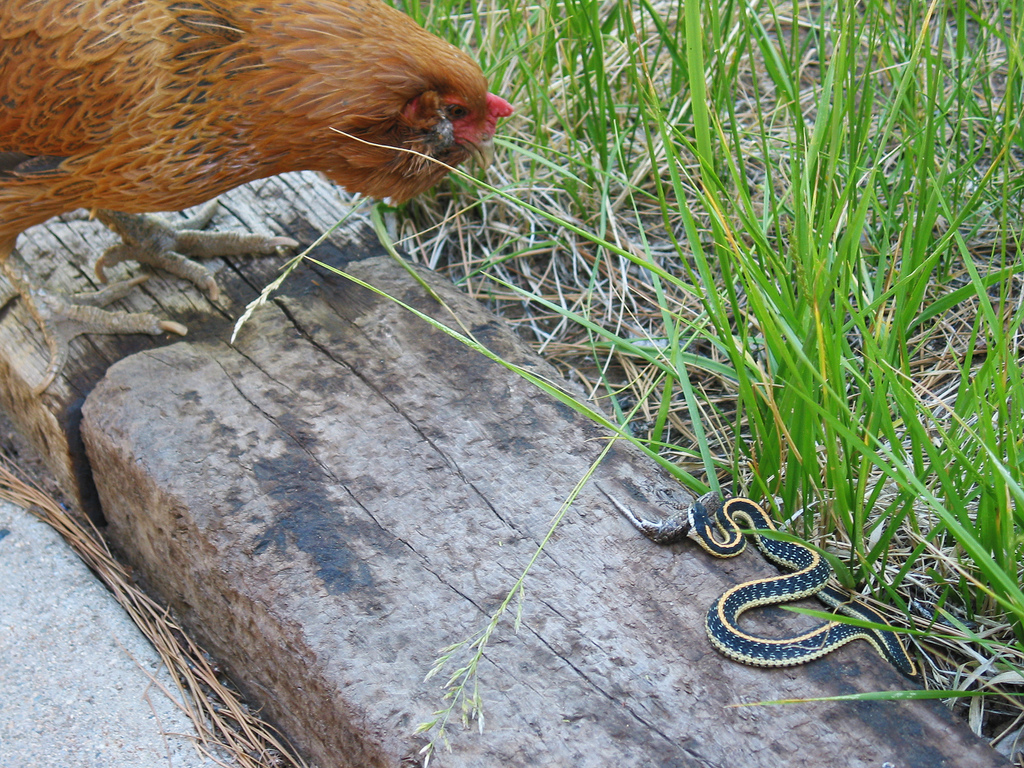
Flickr user SierraValleyGirl
If you have snakes around the coop, it's one sign that you have vermin making merry in the coop and most likely eating your chicken feed. Weasels are another type of vermin, but rather than eat the chicken feed as mice do, weasels attack and kill chickens.
Vermin also spread disease... snakes to the rescue!
You can actually make snakes work to your advantage. Snakes are natural predators, and they eat vermin (mice and rats and even weasels). Snakes also eat some insects, like cockroaches and slugs.
In the predator chain, snakes snacking around your coop on the prey you WANT them to go after could actually help reduce the numbers of pests taking up residence in the coop and helping themselves to your feed.
Signs You Might Have a Snake in the Coop
Fewer Eggs or Missing Eggs: If you have noticeably fewer eggs, you might possibly have an egg-eating snake getting access to the coop and helping himself. Other reasons for fewer eggs? Chickens tend to slow down laying in fall and winter, or when stressed by heat or molt, or it could be that they have found a new place to lay out of sight (free-range hens will often find a hidden spot to lay).
Check in deep litter and in the rafters, and for access where snakes might be able to get in the coop.
Regurgitated Eggshells: Snakes regurgitate compressed eggshells, free of yolk, and curled lengthwise into a cigar-like shape. If you see these, something scaly might be looking for an easy meal.
Snake skins: Snakes shed their skins. If you find a translucent, dry, scaly snakeskin in your coop, this is a sign of a snake that is way too comfortable in your coop.
A chicken with a wet head, or a wet chick. A wet head may be sign of a snake that gave up, but tried to eat one of your chickens.
What Kind of Snakes Eat Chicken Eggs?
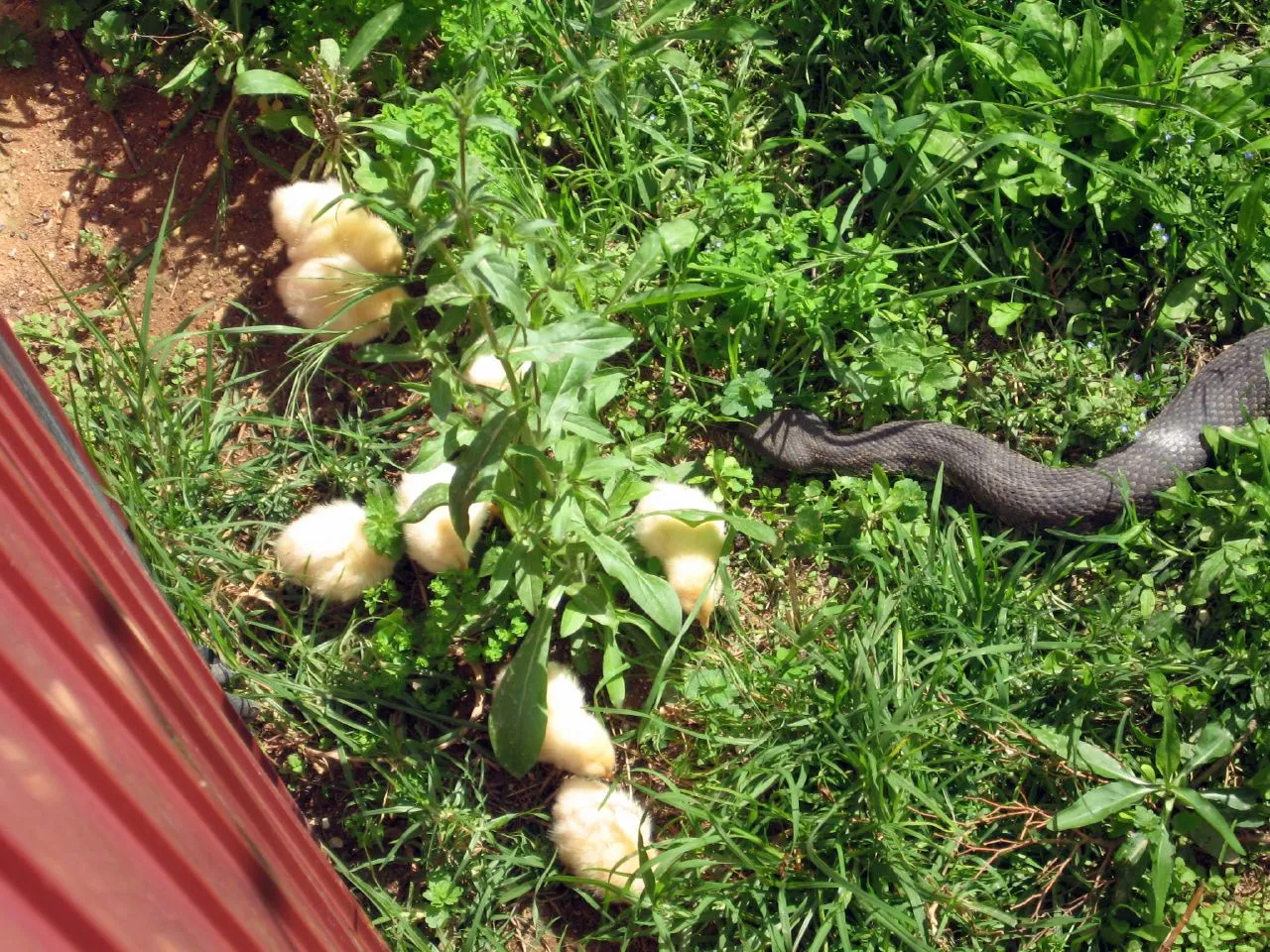
Flickr user Natasha Vora
What snakes are you likely to find in your coop eating chicken eggs or preying on chicks? Typically, in the United States, king snakes, milk snakes, rat snakes, black snakes, and chicken snakes are the snakes most often found in coops.
But no worries, we'll tell you how to handle them!
Best Practices: Snake Exclusion & Humane Snake Traps
How can you balance the benefits of any local snakes with the potential threats snakes pose to your chickens? The best practice is to make sure your coop keeps snakes away. You need to find the access points where a snake could come in and block those access points to repel snakes out of your chicken coop and nesting boxes.
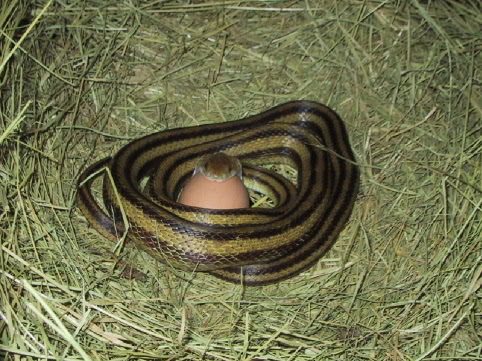
Photo: Southern Agrarian
Replace any one-inch chicken wire screening with hardware cloth. We screen our windows and door with 1/4-inch hardware cloth (a wire, sturdy mesh is much stronger than chicken wire) to keep out raccoons, weasels, and snakes.
Check door gaps and fit with weather stripping or additional door molding so there are no openings larger than one-half inch (and one-quarter inch if you can).
Snakes can enter a coop through very small openings. In fact, even large snakes can get into a coop through any opening larger than one-quarter to one-half-inch. Tiny!
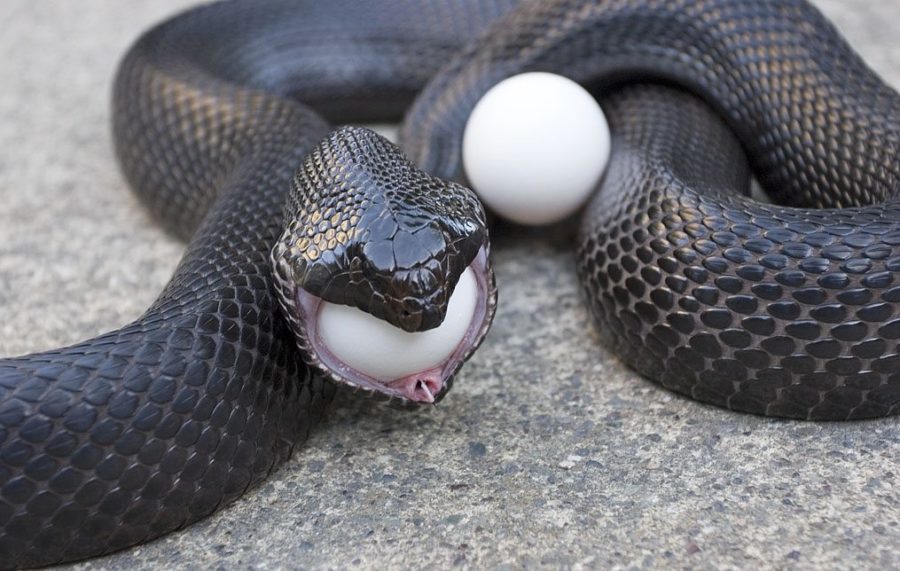
Photo: kingsnake.com
Does your coop have a solid floor? If not, install a coop apron of hardware cloth (a sturdy mesh) to keep snakes and other burrowing predators out of your coop and run.
Rodent proofing: make the coop less attractive to mice and rats. Fewer vermin equals fewer potential meals for snakes, and so a less attractive hunting ground for snakes. Store chicken feed in rodent-proof containers, and consider a treadle feeder that the chickens have to step on to access food.
Keep areas around the coop clear and free of hiding spots for snakes. Keep grass and bushes well trimmed. Remove dead leaves and brush piles and keep the outdoor area and outdoor run clear.
Snakes like cover to hide in (and so do mice). Do not leave a convenient place near your coop for mice and snakes! The fewer places there are to hide, the less attractive a coop will be for vermin and snakes.
Less Effective (Not Recommended) Methods to Keep Snakes Out of Chicken Coops
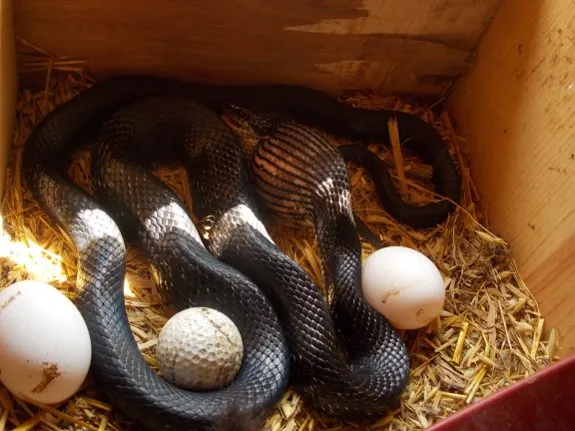
Photo: The Walden Effect
Golf balls are not the best way to trap a snake in comparison to other available methods. The thought is that snakes will eat the golf ball, which it can't digest. With the golf ball inside it, the snake is too big to get out of the coop. Also, since they can't digest the golf ball, it's game over for the snake.
Unfortunately, trapping snakes with golf balls doesn't actually work most of the time. First of all, most snakes are smart enough to ignore golf balls (snakes have a finely-tuned sense of smell). If a snake does try a golf ball, it should be pretty easy for the snake to regurgitate a golf ball or other "fake" indigestible "egg."
Also not recommended: bird netting trap. This is a loose roll of bird netting with a twist in it, frequently used by birdwatchers protecting nests of baby birds. The snake ventures into the netting, and the snake gets stuck.
It's not realistic to untangle an angry or scared snake from a tangle of netting. Your chickens also might get stuck in the netting. Skip this kind of trap. If you have adequately snake-proofed your coop, there is no need to kill snakes. Instead of this trap, consider the two humane trap options above.
Snake repellent products are available. We can't recommend these since most depend on strong odor or toxic chemicals (see mothballs below). We hear they are not effective at deterring snakes.
If you have used a snake repellent successfully to keep chickens out of your coop, let us know!
Mothballs are toxic. Yes, mothballs are considered a snake deterrent but they are toxic. No snake in its right mind would eat mothballs or be deterred from eggs by the smell of mothballs anyway.
Skip mothballs, they won't work to keep snakes out of your chicken coop.
With Snakes, An Ounce of Protection Is Worth a Pound of Cure
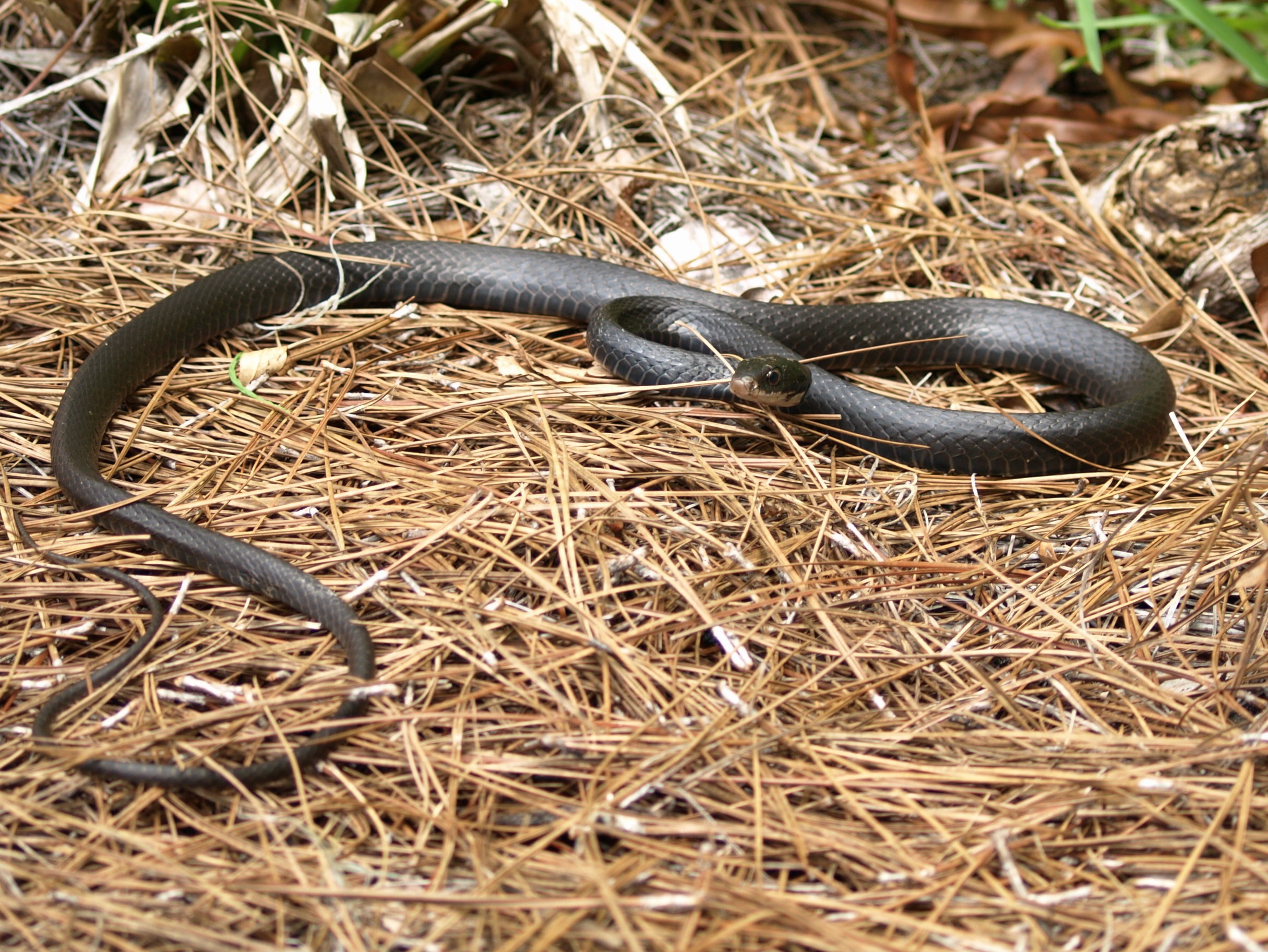
So the next time you see a snake and let out a shriek of surprise, try to remember that snakes can have benefits if you work with their natural tendencies by snake-proofing your coop!
In an ideal world, you would have a friendly snake or two patrolling outside the coop for mice, rats, and other members of the rodent population, but Mr. or Mrs. Snake would leave your chickens, their fresh eggs, and baby chicks alone.
In the real world, to make sure your chickens are protected from wild animals of all shapes and sizes, including snakes, you have to do a bit of work.
Check out our checklist on how to have best chicken coop ever! Good luck!

Photo: Daphne Cybele
Remember that black rat snakes (aka western rat snake) will bite! Other snakes to be cautious of? Water snakes, pine snakes, chicken snake or gray rat snake, yellow rat snake and the eastern rat snake are all snakes that should be on your radar.
Do you have any tips? Tell us on the Wide Open Pets Facebook page!
This post was originally published on Jun 3, 2019.
